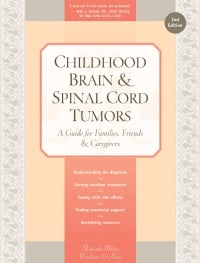Childhood Brain and Spinal Cord Tumors
Last day of treatment
The last day of treatment usually includes a physical examination, blood work, an MRI scan, and a discussion with the neuro-oncologist. The doctor should review the treatment that was given, outline the schedule for MRI scans and blood tests for the future, and sensitively discuss the potential for long-term side effects. One group of parents presented the following suggestions for the last day of treatment to doctors at a major children’s hospital:
- Schedule enough time to have a conversation
- Bring a sense of closure to the active phase of treatment
- Express happiness that all has gone well
- Be realistic but hopeful about the future
- Praise the child for handling a very difficult time in her life with grace (or courage, or whatever word is appropriate)
- Praise the parents for all of their hard work
- Allow time for the parents to give the doctor feedback and thanks
- Give a certificate of accomplishment to the child
- Be aware that families are relieved but fearful of the future
The nurses at our clinic really made a big deal on the last day of treatment. They brought out a cake and balloons, and sang “Going off Chemo” to the tune of “Happy Birthday to You.” They made Gina a banner and bought her a present. I sat in a corner and cried, because I was scared to death of the future. A nurse came over, hugged me, and said, “This must be so hard; we’re taking away your security blanket.” She was exactly right.
Table of Contents
All Guides- Introduction
- 1. Diagnosis
- 2. The Brain and Spinal Cord
- 3. Types of Tumors
- 4. Telling Your Child and Others
- 5. Choosing a Treatment
- 6. Coping with Procedures
- 7. Forming a Partnership with the Treatment Team
- 8. Hospitalization
- 9. Venous Catheters
- 10. Surgery
- 11. Chemotherapy
- 12. Common Side Effects of Chemotherapy
- 13. Radiation Therapy
- 14. Peripheral Blood Stem Cell Transplantation
- 15. Siblings
- 16. Family and Friends
- 17. Communication and Behavior
- 18. School
- 19. Sources of Support
- 20. Nutrition
- 21. Medical and Financial Record-keeping
- 22. End of Treatment and Beyond
- 23. Recurrence
- 24. Death and Bereavement
- 25. Looking Forward
- Appendix A. Blood Tests and What They Mean
- Appendix C. Books and Websites

